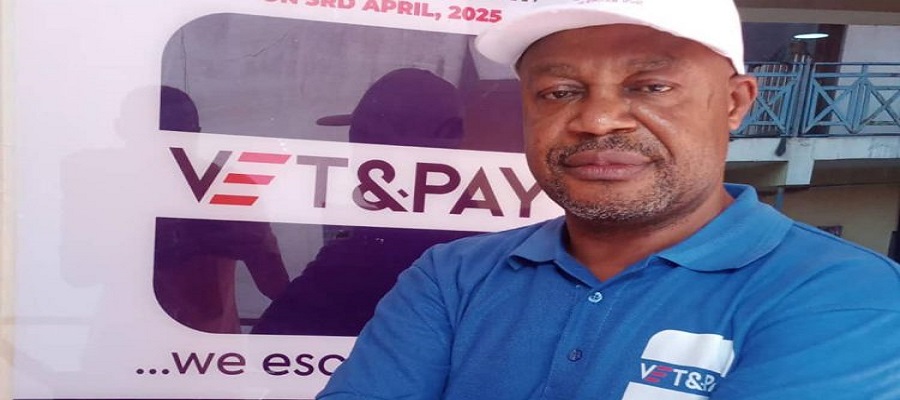E-Financial
Nigerian Banking Sector Fraud Increases Threefold to N53Bn -NIBSS

Money lost to fraud in Nigeria’s banking system has nearly tripled over the past five years, according to an analysis released by the Nigeria Inter-Bank Settlement System (NIBSS).

NIBSS estimated that N52.3 billion was lost to fraud in 2024, compared to 11.6 billion in 2020.
The report also indicated that fraudsters illegally attempted to obtain N86.4 billion in 2024.
These figures were reported shortly after the latest GDP statistics showed a fourth-quarter growth of 3.8 per cent, the highest rate in three years, primarily fueled by the services sector, which includes finance and insurance.
Nigeria’s digital payments system is considered one of the strongest in Africa, and tech startups in the nation secured approximately $400 million in funding in 2024.
Such financial services have gained greater significance recently due to a cash shortage and currency reforms, which have driven more users to abandon physical banknotes.
“The amount lost to fraud has increased over the past five years along with the growth of financial transactions in the digital payments sector,” NIBSS said.
Reports indicated that fraudsters are employing various tactics, including the conversion of funds into gift cards and the establishment of accounts using the stolen identities of elderly individuals, minors, and foreigners.
The report suggested that N400 million had been deposited into accounts created with the stolen identities of senior citizens.
NIBSS noted that some funds have been retrieved, and bank employees involved in the fraud are under investigation.
Nigeria is classified as a “grey list country” by international watchdogs, alongside nations such as South Sudan, Bulgaria, Monaco, and Croatia, due to weaknesses in its measures against money laundering and financing terrorism.
Economic and Financial Crimes Commission (EFCC) has also apprehended multiple foreigners concerning internet fraud. In December, the agency took into custody 792 suspects in the upscale Victoria Island region of Nigeria’s central city, Lagos.
According to the agency, at least 192 suspects were identified as foreign nationals, with 148 being Chinese.
Dele Oyewale, spokesman, EFCC, said in a press release that foreign criminal organizations recruit Nigerian partners to target victims online through phishing schemes, primarily focusing on individuals in the United States, Canada, Mexico, and various European nations.
E-Financial
TCL Launches ‘vetandpay’ to Combat Online Transaction Fraud

Tradewyse Concepts Limited (TCL), Nigeria-based technology solution provider has launched a product called “vetandpay” to address the issues of trust and fraud in online business transactions in the country.

Dr Kalu Ibe, founder and chief executive officer, Tradewyse Concepts Limited
Dr Kalu Ibe, founder and chief executive officer, Tradewyse Concepts Limited, stated that the software was proudly developed by a team of Nigerians.
Speaking at the product dedication ceremony in Abuja, Ibe explained that the app aims to reduce corruption by restoring trust and integrity. He added that it would inspire confidence in both business and the broader transactional environment in Nigeria.
“Today, I present vetandpay.ng, powered by Vetandpay Technologies Ltd, Africa’s foremost escrow company, a subsidiary of TCL,” Ibe said.
“What started as a spark two years ago is now shining brightly over Nigeria’s transactional space, bringing healing with its rays.”
He outlined the various escrow services offered, including auto purchase escrow, procurement escrow, service-based escrow, e-commerce escrow, and property escrow, with more services expected to be added.
Ibe emphasised that the service is available to Nigerians both at home and abroad, promising zero losses in all business transactions when using vetandpay.
Through its Corporate Social Responsibility (CSR) programme, TCL plans to initiate a comprehensive tech training programme for teenagers in Nigerian schools. Ibe highlighted that the initiative aims to equip young people with technological skills, preparing them to enter the digital economy and drive innovation.
Ntufam Ugbo, project director, commented that vetandpay is transforming the business landscape in Nigeria by building trust between buyers and sellers.
“What vetandpay does is act as a middleman between the buyer and the seller,” she said.
Mrs Rachel Samuel, head of Customer Service at vetandpay, described the platform as a secure payment solution designed to eliminate fraud in online transactions.
“Our basic goal is to address the issue of receiving something different from what was ordered,” she explained.
Referring to a report by the Federal Trade Commission, Samuel pointed out that consumers lost over 8.8 billion dollars to fraud in 2022, a 30 per cent increase from the previous year. She noted that with vetandpay, both parties to a business transaction could have peace of mind and zero losses.
She encouraged Nigerians to embrace the services provided by the platform by downloading the vetandpay app and using the technology to secure their transactions.
‘‘Today marks the beginning of a new era in secure online transactions. Whether you are a business owner, freelancer, or everyday buyer, vetandpay is here to protect your hard-earned money,” Samuel concluded.
E-Financial
FG Asks World Bank for Fresh $10.50m Loan to Enhance CBN Technical Capacity

Nigeria has approached the World Bank for a fresh $10.50m loan to enhance the Central Bank of Nigeria’s (CBN) technical capacity and modernise the country’s domestic payment infrastructure.

Olayemi Cardoso, Governor, Central Bank of Nigeria
According to information on the World Bank website on Thursday, the proposed CBN Technical Assistance Facility seeks to support integrating innovative technologies and data science into the CBN’s supervisory processes.
This is expected to help the apex bank tackle long-standing and emerging challenges in Nigeria’s rapidly evolving financial landscape while improving the domestic payment infrastructure for remittances.
The project, currently at the concept review stage, will focus on three key areas. Firstly, it aims to strengthen the CBN’s institutional capacity to keep pace with technological advancements through a robust governance framework, expert advisory support, peer-to-peer central bank exchanges, and modernisation of the CBN’s internal processes to align with the digital era.
Secondly, it will enhance the CBN’s supervisory capacity through technology and data improvements. This involves funding modern technical solutions, including Supervisory Technology systems, to improve data accuracy, operational efficiency, and risk-based supervision.
Thirdly, it aims to modernise domestic payment systems for remittances to improve their safety and reliability.
It will explore innovative methods to attract informal remittance flows into formal channels while conducting annual surveys on remittance households and fostering peer-to-peer learning for knowledge exchange.
According to the World Bank, the objective of this project is “to strengthen technology-enabled, data-driven, risk-based supervision at the CBN and improve domestic payment infrastructure for remittances in Nigeria.”
The project aligns with the government’s pursuit of a cashless economy and the increasing adoption of digital financial services in Nigeria.
The scheme, which has a commitment amount of $10.50m, is scheduled for board presentation approval on June 12, 2025. The implementing agency is the Central Bank of Nigeria.
E-Financial
Sterling Bank Makes Online Transfer Charges Free of Charge

Sterling Bank has called for the cancellation of bank transfer fees by major banks, announcing it will no longer take any money for itself for any local online transactions by its customers.

The announcement, made on April 1st, initially sparked widespread arguments, with many assuming it was a marketing prank tied to April Fools’ Day.
However, Sterling Bank, in a statement, has confirmed that it is not a stunt, that the zero-transfer-fee policy was real, and effective immediately.
With this move, Sterling becomes the first major Nigerian bank to take a definitive stand against the long-standing practice of charging customers for everyday digital transfers, an issue that has grown increasingly contentious as digital banking adoption deepens.
“We believe access to your own money shouldn’t come with a penalty,” said Obinna Ukachukwu, growth executive leading the Consumer and Business Banking Directorate, Sterling Bank
“This is more than a financial decision, it’s a values-based one. It reflects our commitment to making banking fair, inclusive, and truly customer focused.
“We’re not yet the biggest bank in Nigeria, but we’ve been the boldest,” Ukachukwu added.
“Sterling fearlessly believes in the future of Nigeria, and this is us backing Nigerians with more than words,” it sated.
Under the new policy, Sterling customers will enjoy free transfers for all local transactions conducted via the bank’s mobile app. This translates into significant savings, particularly for individuals and new small business owners who make frequent daily transfers.
The bank’s latest move has been met with widespread public approval, sparking positive reactions across social media and placing pressure on industry peers to follow suit.
We’re proud to lead this change,” Ukachukwu added. “We hope it inspires others to think differently about what customers truly need from their banks, not just in services, but in values.”

 News1 day ago
News1 day agoUS Cancels Visas for All South Sudanese Passport Holders

 News1 day ago
News1 day agoMeningitis Outbreak Kills 151 in Nigeria – NCDC

 News1 day ago
News1 day agoAOT Issues Bench Warrant against Sanusi, Aero Contractors MD

 News1 day ago
News1 day agoAfrimash Launches USSD Code to Revolutionize Poultry Farming and Combat Counterfeit Farm Produce

 News1 day ago
News1 day agoSERAP Calls on Tinubu to Reject $1.08Bn Loan, Probe Missing Funds

 News1 day ago
News1 day agoNigeria’s Debt Escalates to N144.67 Trillion, Fueled by Borrowing Surge

 General News1 day ago
General News1 day agoUniversity Don Seeks Ban of Smartphones, Social Media in Schools

 General News1 day ago
General News1 day agoAmid Rising Investor Confidence in Nigeria, Woodhall Capital Foundation Trains Captains of Industry

























